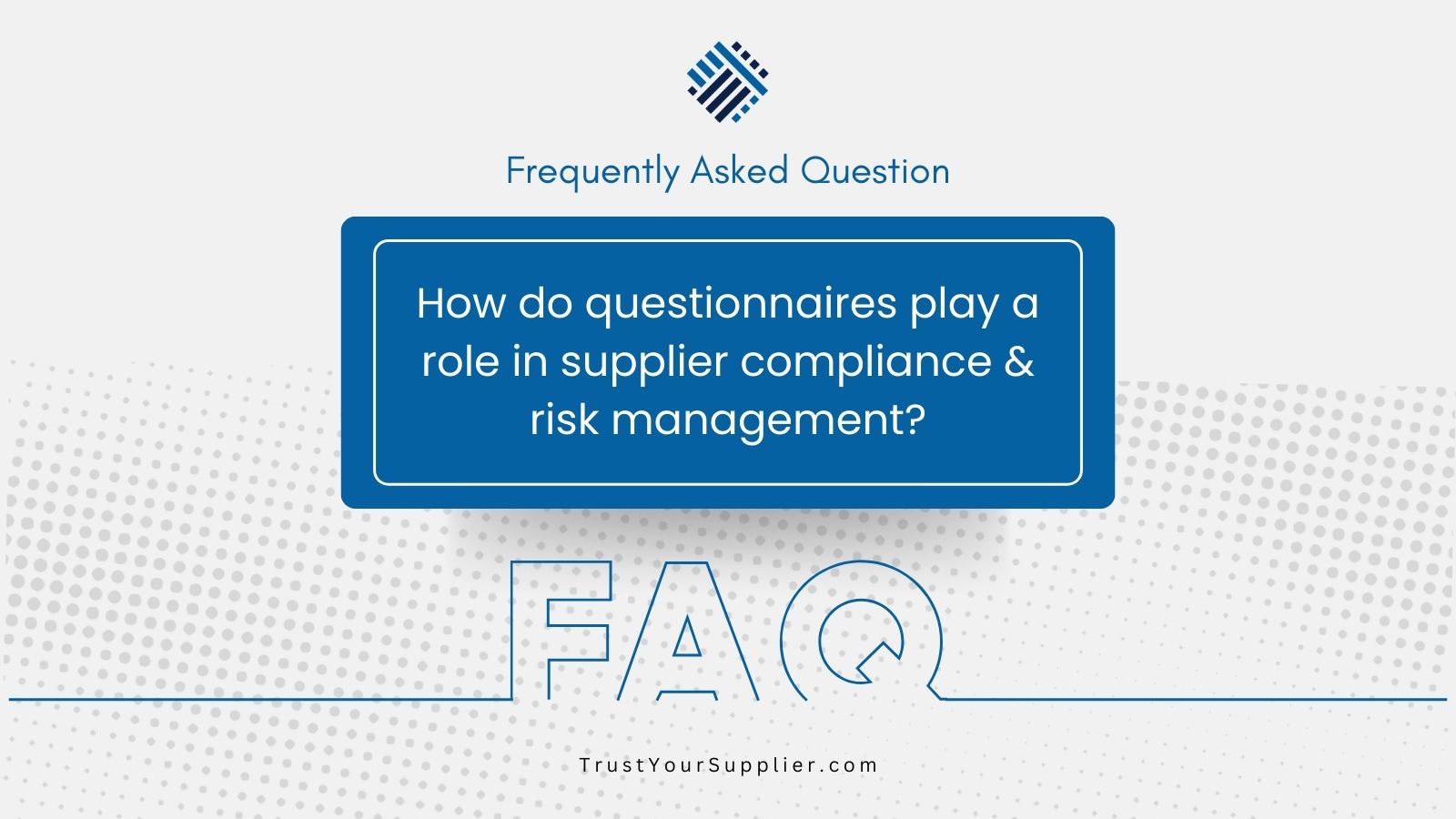Frequently Asked Question: How do questionnaires play a role in supplier compliance and risk management?

Supplier questionnaires are a cornerstone of modern compliance and risk management programs. They provide a structured way to verify that vendors meet your organization’s standards for financial stability, sustainability, data security, and legal compliance.
Without consistent questionnaires, compliance checks can become uneven. Different teams may ask different questions, overlook important risks, or require suppliers to fill out multiple overlapping forms. This not only frustrates suppliers but also increases the risk of incomplete or inaccurate data.
Well-designed questionnaires help procurement and compliance teams:
-
Collect comparable data from all suppliers
-
Verify information against legal requirements and internal policies
-
Maintain records for regulators and internal reporting
-
Spot early signs of supplier distress or non-compliance
When integrated into a digital supplier management system, these questionnaires become even more powerful because they enable automation, real-time visibility, and forward-looking insights that go beyond simple data collection.
At Trust Your Supplier (TYS), questionnaires are more than just forms
TYS questionnaires are part of a connected compliance ecosystem that simplifies how procurement and risk teams gather, review, and act on supplier data. For example, here is how TYS questionnaires help streamline compliance and strengthen supplier oversight:
1. Standardized questionnaires for efficiency
TYS works with a group of global buying organizations to maintain standardized questionnaires aligned with industry and legal best practices.
-
Regularly updated to reflect new laws and ESG standards
-
Reduce extra work so suppliers only answer what is needed
-
Keep questions consistent across departments and regions
2. Custom questionnaires for specific risks
Every organization faces unique regional, product, or legal risks. TYS lets you build custom questionnaires that focus on your specific needs without starting from scratch.
-
Tailor questions to regional or sector-specific rules
-
Capture data unique to your organization’s risk profile
-
Combine consistent and custom questions in a single workflow
3. Grouping questionnaires for simplicity
TYS allows you to create questionnaire groups. These are sets of related questionnaires tied to supplier location, product type, or service category. This way, suppliers receive only the relevant forms, and teams complete all necessary checks efficiently.
4. Automated scoring for smarter workflows
Manual review can be slow and prone to errors. With TYS, approvals and scoring are automated based on your internal rules.
-
Supplier responses are scored automatically
-
Answers outside your preferred range are flagged for review
-
Teams can focus on real risks instead of routine checks
5. Forward-looking compliance
As new global rules appear, predictive rules in TYS help decide which questionnaires to assign based on supplier profiles. In this way, you stay ahead of regulatory changes instead of reacting to them.
-
Automatically match suppliers to the right compliance set
-
Scale onboarding and due diligence with less manual effort
6. Support for internal checks
In addition to supplier-facing questionnaires, teams can create internal checklists to coordinate reviews, track next steps, and confirm off-platform tasks are done. This keeps the process organized and prevents steps from being missed during onboarding or requalification.
7. Clear audit trail and transparency
TYS questionnaires create a clear record for each supplier. Everything from response history to scoring is stored and easy to access. As a result, organizations can:
-
Show compliance during regulatory reviews
-
Maintain transparency with internal stakeholders
-
Monitor supplier performance over time
Why it matters
Questionnaires in TYS do not just collect information. They create a structured, automated, and auditable path toward better supplier compliance and lower risk.
Efficiency gains from automation
Automation reduces manual work, speeds up onboarding, and simplifies approvals. For example, instead of reviewing every response, teams focus on flagged items that need attention.
Improved visibility and confidence
With centralized data, organizations gain insights across regions, categories, and supplier types. This provides confidence that suppliers meet required standards and reduces the chance of unexpected compliance issues.
Additional FAQs
What types of supplier questionnaires are most effective
Effective questionnaires balance standardized compliance checks with custom questions for specific risks. They should cover rules, financial stability, cybersecurity, ESG practices, and internal policies. Using a system like TYS ensures questionnaires are consistent, automated, and easy to manage.
How do automated questionnaires improve supplier onboarding
Automated questionnaires reduce manual review time, flag potential risks, and ensure suppliers provide complete and accurate information. In this way, organizations can accelerate onboarding while keeping compliance standards high.
Can questionnaire data help monitor supplier risk over time
Yes. By storing responses in a central system, organizations can track changes, identify trends, and spot early warning signs of non-compliance or financial instability. Continuous monitoring helps maintain a resilient and transparent supply chain.
Why should organizations combine consistent and custom questionnaires
Consistent questionnaires cover industry-wide best practices and legal requirements, while custom questionnaires address unique business, regional, or product-specific risks. Combining both ensures a complete and efficient compliance program.
How do questionnaire groups simplify compliance management
Questionnaire groups bundle related questionnaires by location, product, or risk category. This makes it easier for suppliers to complete forms and ensures that all necessary compliance checks are done efficiently.
Learn more
Discover how TYS questionnaire features enhance supplier compliance and risk management.
Explore the TYS Questionnaire Features Infographic
